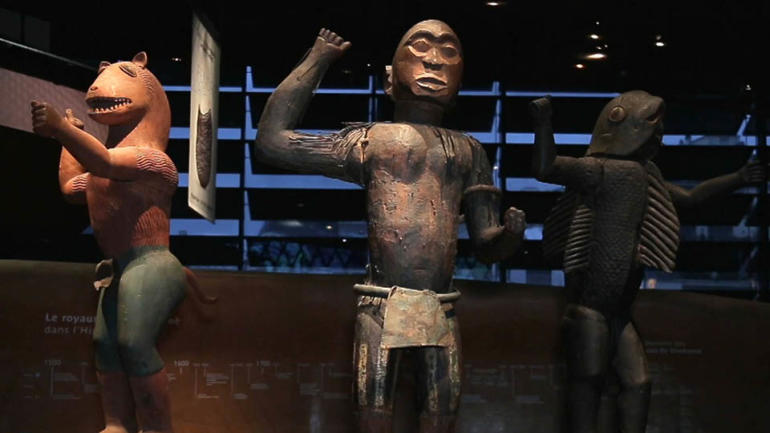A debate is underway in France about whether to return tens of thousands of works of art to their rightful owners. Most were plundered from African nations during more than a century of French colonization.
A new government report suggests returning the art and has the backing of President Emmanuel Macron.
CGTN’s Stefan de Vries reports from Paris.
The stunning Quai Branly Jacques Chirac Museum houses the art collection of France’s former colonies. But now the time has come to turn a page.
The museum contains more than 70,000 objects from Africa. Giving all those pieces back will put huge pressure on other art collections from other colonial powers, like the U.K., Spain and the Netherlands.
French President Emmanuel Macron has announced these artworks should be returned to their country of origin. The Republic of Benin in West Africa is the first to benefit from this new policy. Much to the delight of a Franco-Beninese arts dealer
“It’s a very important decision of the French president because the youth in Africa is very keen to know its history,” said Marie-Cecile Zinsou, “The people want to see these objects back because they want to see their history back.”
Yet, there are also critics of the report, like Yves Debie, a lawyer who specializes in arts trade.
“Macron just received the report. He already said: ‘I will restitute the art.’ But the law hasn’t changed. So what does it mean?” Debie asked. “They have made lists, country by country. If the country is interested in any art object, a commission will decide what to do, and then there will be a bilateral agreement. That’s not respecting the law, that’s spin!”
One of the controversial objects in the museum is a ceremonial throne. It will now be given back to Benin. According to Yves Debie, it’s risky to transfer this artwork which has been kept in excellent condition to the rather basic museums in Africa.
“Belgium transferred 114 objects to Congo in the 1980s. Well, when we made the inventory ten years later, almost all had been sold or had simply disappeared,” said Debie.
But arts dealer Marie-Cecile Zinsou said those are unfounded fears.
“No, it’s not going to be the emptiness of French museums. Some of them will ask, some won’t. And they’re not going to ask for 46,000 objects. That doesn’t happen. It’s gonna’ be a cooperation and French museums and African museums are gonna’ work together. And I think everybody is going to be enriched by this restitution.”
The restitution of artwork is a radical shift in policy. But it could also mean a fresh start for those countries that possess a number of artifacts acquired without consent during the colonial era.
 CGTN America
CGTN America
